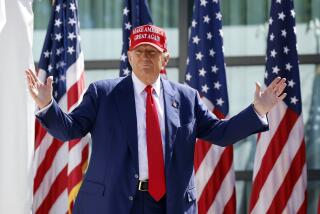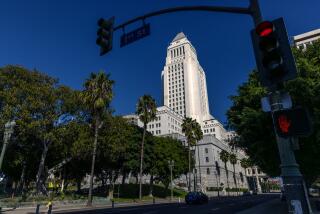Grand juries are ‘relic of another time’: New York’s top judge urges reform
- Share via
After a year of controversial grand jury decisions following police-involved killings across the country, New York’s top jurist on Tuesday called for major reforms to the state’s grand jury process, introducing legislation that would grant the public greater access to testimony delivered and evidence presented during those cases.
During his State of the Judiciary speech, Chief Judge Jonathan Lippman said he had introduced legislation that would compel courts to disclose the specific charges filed, instructions given to a grand jury panel and the testimony provided by public servants and experts in cases of great public interest. The bill would also require that a judge be physically present during hearings involving police officers charged with assault or homicide.
“In cases of significant public interest, secrecy does not further the principles it is designed to protect but, in fact, significantly impedes fair comment and understanding of the court process,” Lippman said, according to a transcript of the remarks delivered Tuesday.
Lippman’s bill comes less than four months after a Staten Island grand jury declined to indict a New York City police officer in the death of Eric Garner, who collapsed after he was placed in what many have described as a chokehold during an arrest in July. Chokeholds have been outlawed as a law enforcement tactic by nearly every major police department in the U.S.
Under New York state law, only presiding district attorneys have the power to make grand jury information public.
After the Garner decision, Richmond County Dist. Atty. Daniel Donovan asked a state court to make public only the type of evidence reviewed by the grand jury and the number of witnesses who testified.
Transcripts of witness testimony, Garner’s autopsy report and the exact charges Donovan pursued against Police Officer Daniel Pantaleo remain secret.
Donovan’s decision was in stark contrast to decisions made by St. Louis County prosecutor Robert McCulloch in the wake of Michael Brown’s death in Ferguson, Mo. Brown, like Garner, was unarmed at the time of his lethal encounter with a police officer. McCulloch elected to make testimony and witness statements public just minutes after the grand jury decided not to indict Ferguson Police Officer Darren Wilson, who shot Brown to death.
The New York state chapter of the American Civil Liberties Union and Garner’s family are suing to make that information public. Calls to a spokesman for Donovan were not immediately returned.
Lippman’s bill is the latest in a series of moves to make investigations into police killings of civilians more transparent and less ripe for skepticism. Two New York state Assembly members introduced similar legislation late last year, and state Atty. Gen. Eric Schneiderman asked Gov. Andrew Cuomo for the power to investigate police killings, which would essentially allow him to appoint special prosecutors in cases like Garner’s.
The move is meant to alleviate concern that district attorney’s offices cannot investigate police officers without bias, as the agencies normally work together on homicide investigations and various task forces.
In his remarks, Lippman said the bill was meant to preserve the integrity of the judicial process rather than place police under added scrutiny, and he called grand juries “a relic of another time that must be modernized and updated.”
Follow @JamesQueallyLAT for breaking news
More to Read
Sign up for Essential California
The most important California stories and recommendations in your inbox every morning.
You may occasionally receive promotional content from the Los Angeles Times.











